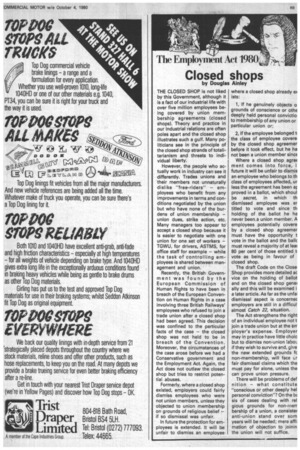The Employment Act 198k
Page 71

If you've noticed an error in this article please click here to report it so we can fix it.
Closed shops
by Douglas Amley THE CLOSED SHOP is not liked by this Government, although it is a fact of our industrial life with over five million employees being covered by union membership agreements (closed shops). Theory and practice in our industrial relations are often • poles apart and the closed shop illustrates such a gulf. Many politicians see in the principle of the closed shop strands of totalitarianism and threats to individual liberty.
However, the people who actually work in industry can see it differently. Trades unions and their members not unnaturally dislike "free-riders" — employees who benefit from any improvements in terms and conditions negotiated by the union but who have none of the burdens of union membership — union dues, strike action, etc. Many managers too appear to accept a closed shop because it is easier to negotiate with one union for one set of workers — TGWU, for drivers, ASTMS, for office staff for example — while the task of controlling employees is shared between management and union.
Recently, the British Government was found by the European Commission of Human Rights to have been in breach of the European Convention on Human Rights in a case involving three British Railways' employees who refused to join a trade union after a closed shop had been agreed. This decision was confined to the particular facts of the case — the closed shop was not held to be in breach of the Convention. Moreover, the circumstances of the case arose before we had a Conservative government and the Employment Act. Again, the Act does not outlaw the closed shop but tries to restrict potential abuses.
Formerly, where a closed shop existed, employers could fairly dismiss employees who were not union members, unless they objected to union membership on grounds of religious belief — if so dismissal was unfair.
In future the protection for employees is extended. It will be unfair to dismiss an employee where a closed shop already e) ists: 1, If he genuinely objects o grounds of conscience or othe deeply held personal convictio to membership of any union or particular union or;
2, If the employee belonged t the class of employee covere, by the closed shop agreemer before it took effect, but he ha not been a union member sina Where a closed shop agree ment comes into force, i future it will be unfair to dismis an employee who belongs to th class of employees affected, ur less the agreement has been am proved in a ballot, which shoul be secret, in which th dismissed employee was er titled to vote and since th holding of the ballot he ha never been a union member. A employees potentially covere by a closed shop agreemer must have the opportunity t vote in the ballot and the balk must reveal a majority of at leai 80 per cent of those entitled t, vote as being in favour of closed shop.
The draft Code on the Close. Shop provides more detailed ac vice on the holding of ballot and on the closed shop genei ally and this will be examined i a later article. As far as the unfai dismissal aspect is concernec employers are still in a difficut almost Catch 22, situation.
The Act strengthens the right of an individual employee not t join a trade union but at the enployer's expense. Employer may in practice have little choic but to dismiss non-union laboc if they wish to survive and, give the new extended grounds fc non-membership, will face ur fair dismissal claims which the must pay for alone, unless the can prove union pressure.
There will be problems of def nition — what constitute "conscious or other.deeply het personal conviction"? On the Ix sis of cases dealing with rel gious grounds for non-rnerr bership of a union, a consister anti-union stand over som years will be needed; mere affil mation of objection to joinin the union will not suffice.












































































































